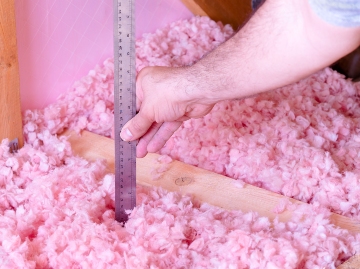1. Different Types of Insulation Materials
There are various insulation materials available, each with its own set of benefits and applications. Understanding the differences between them is crucial for selecting the best option for your home.
Spray Foam: Known for its superior insulating ability, spray foam creates an airtight seal that can reduce air leaks significantly. It’s ideal for irregularly shaped spaces and areas prone to drafts.
Cellulose: Made from recycled paper, cellulose is an eco-friendly option that offers solid thermal performance and fire resistance.
Each material has its own R-value (the measurement of thermal resistance), so working with a professional insulation service can help you choose the most efficient option for your needs.
2. The Importance of R-Value
The R-value of insulation measures its ability to resist heat flow. The higher the R-value, the more effective the insulation is at keeping your home warm in winter and cool in summer. The recommended R-value varies depending on your geographic location and the specific area of your home being insulated. For example, homes in colder climates typically require insulation with a higher R-value, especially in the attic, which can lose a significant amount of heat without proper insulation.
Professional insulation services can help you determine the correct R-value for your home based on local building codes and climate considerations.
3. The Energy Savings Potential
Investing in insulation can lead to substantial energy savings. According to the U.S. Department of Energy, properly insulating your home can reduce heating and cooling costs by up to 20%. This translates to hundreds of dollars in annual savings, especially in older homes that may be under-insulated or lack insulation altogether.
An insulation service will conduct an energy audit to identify areas of your home that could benefit from improved insulation. Sealing these areas will not only lower your energy bills but also reduce your home’s environmental footprint.
4. Signs Your Home Needs New Insulation
Many homeowners don’t realize their insulation has deteriorated until they experience discomfort or high energy bills. Here are some signs that indicate it’s time to upgrade your insulation: drafts, high energy bills, uneven temperature, and pest issues.
Scheduling an inspection with a professional insulation service can help you assess the condition of your existing insulation and determine if replacement is necessary.
5. How Insulation Improves Indoor Comfort
Beyond energy savings, properly installed insulation contributes significantly to indoor comfort. It minimizes temperature fluctuations, eliminates drafts, and helps maintain a consistent indoor temperature. Insulation also acts as a barrier against outdoor noise, making your home quieter. In addition, improved indoor air quality can be achieved by reducing moisture infiltration, which lowers the risk of mold and mildew growth.
An insulation service will assess your home’s insulation needs and recommend solutions that ensure year-round comfort and better air quality.
6. Why Professional Installation Matters
While some insulation materials are available for DIY installation, hiring a professional insulation service ensures that the job is done correctly and efficiently. Proper installation is crucial for maximizing insulation performance. Gaps, compressions, or improper placement can significantly reduce the effectiveness of the insulation.
Experienced insulation professionals will ensure that materials are installed according to industry standards and local building codes. They also have access to high-quality products and specialized tools that may not be available to DIYers.
According to Forbes, the average cost of home insulation ranges between $3,000 and $10,000. Understanding the nuances of insulation services is key to improving energy efficiency, comfort, and home value. By choosing the right materials, considering professional installation, and taking advantage of incentives, you can make a smart investment that pays off for years to come. Be sure to reach out to Zerodraft today for more information on our professional insulation service!


